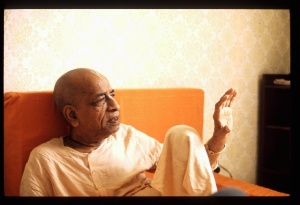SB 10.89.4: Difference between revisions
m (1 revision(s)) |
(Vanibot #0054 edit - transform synonyms into clickable links, which search similar occurrences) |
||
| (One intermediate revision by one other user not shown) | |||
| Line 1: | Line 1: | ||
{{info | {{info | ||
|speaker= | |speaker=Śukadeva Gosvāmī | ||
|listener=King | |listener=King Parīkṣit | ||
}} | }} | ||
[[Category:Srimad-Bhagavatam - Canto 10 Chapter 89|s04]] | |||
[[Category:Bhagavatam Verses Spoken by Sukadeva Gosvami - Vanisource|108904]] | |||
<div style="float:left">'''[[Srimad-Bhagavatam]] - [[SB 10|Tenth Canto]] - [[SB 10.89: Krsna and Arjuna Retrieve a Brahmana's Sons|Chapter 89: Kṛṣṇa and Arjuna Retrieve a Brāhmaṇa's Sons]]'''</div> | |||
<div style="float:right">[[File:Go-previous.png|link=SB 10.89.3]] '''[[SB 10.89.3]] - [[SB 10.89.5]]''' [[File:Go-next.png|link=SB 10.89.5]]</div> | |||
{{RandomImage}} | |||
{{SBnotice}} | |||
==== TEXT 4 ==== | ==== TEXT 4 ==== | ||
<div | <div class="verse"> | ||
sa ātmany utthitam manyum | :sa ātmany utthitam manyum | ||
ātmajāyātmanā prabhuḥ | :ātmajāyātmanā prabhuḥ | ||
aśīśamad yathā vahniṁ | :aśīśamad yathā vahniṁ | ||
sva-yonyā vāriṇātma-bhūḥ | :sva-yonyā vāriṇātma-bhūḥ | ||
</div> | </div> | ||
| Line 17: | Line 22: | ||
==== SYNONYMS ==== | ==== SYNONYMS ==== | ||
<div | <div class="synonyms"> | ||
''[//vanipedia.org/wiki/Special:VaniSearch?s=saḥ&tab=syno_o&ds=1 saḥ]'' — he; ''[//vanipedia.org/wiki/Special:VaniSearch?s=ātmani&tab=syno_o&ds=1 ātmani]'' — within himself; ''[//vanipedia.org/wiki/Special:VaniSearch?s=utthitam&tab=syno_o&ds=1 utthitam]'' — risen; ''[//vanipedia.org/wiki/Special:VaniSearch?s=manyum&tab=syno_o&ds=1 manyum]'' — anger; ''[//vanipedia.org/wiki/Special:VaniSearch?s=ātma&tab=syno_o&ds=1 ātma]-[//vanipedia.org/wiki/Special:VaniSearch?s=jāya&tab=syno_o&ds=1 jāya]'' — toward his son; ''[//vanipedia.org/wiki/Special:VaniSearch?s=ātmanā&tab=syno_o&ds=1 ātmanā]'' — by his own intelligence; ''[//vanipedia.org/wiki/Special:VaniSearch?s=prabhuḥ&tab=syno_o&ds=1 prabhuḥ]'' — the lord; ''[//vanipedia.org/wiki/Special:VaniSearch?s=aśīśamat&tab=syno_o&ds=1 aśīśamat]'' — subdued; ''[//vanipedia.org/wiki/Special:VaniSearch?s=yathā&tab=syno_o&ds=1 yathā]'' — just as; ''[//vanipedia.org/wiki/Special:VaniSearch?s=vahnim&tab=syno_o&ds=1 vahnim]'' — fire; ''[//vanipedia.org/wiki/Special:VaniSearch?s=sva&tab=syno_o&ds=1 sva]'' — itself; ''[//vanipedia.org/wiki/Special:VaniSearch?s=yonyā&tab=syno_o&ds=1 yonyā]'' — whose origin; ''[//vanipedia.org/wiki/Special:VaniSearch?s=vāriṇā&tab=syno_o&ds=1 vāriṇā]'' — by water; ''[//vanipedia.org/wiki/Special:VaniSearch?s=ātma&tab=syno_o&ds=1 ātma]-[//vanipedia.org/wiki/Special:VaniSearch?s=bhūḥ&tab=syno_o&ds=1 bhūḥ]'' — self-born Brahmā. | |||
</div> | </div> | ||
{{SBcollapse}} | |||
==== TRANSLATION ==== | ==== TRANSLATION ==== | ||
<div | <div class="translation"> | ||
Though anger toward his son was now rising within his heart, Lord Brahmā was able to subdue it by applying his intelligence, in the same way that fire is extinguished by its own product, water. | Though anger toward his son was now rising within his heart, Lord Brahmā was able to subdue it by applying his intelligence, in the same way that fire is extinguished by its own product, water. | ||
</div> | </div> | ||
| Line 31: | Line 36: | ||
==== PURPORT ==== | ==== PURPORT ==== | ||
<div | <div class="purport"> | ||
Lord Brahmā is sometimes affected by his contact with the mode of passion. But because he is ādi-kavi, the firstborn and foremost learned scholar in the universe, when anger begins to disturb his mind he can control it by means of discriminating self-examination. In this instance he reminded himself that Bhṛgu was his son. Thus in this verse Śukadeva Gosvāmī draws the analogy that Brahmā's own expansion (his son) served to put out his anger just as water, which originally evolved from elemental fire in the primeval creation, puts out a fire. | Lord Brahmā is sometimes affected by his contact with the mode of passion. But because he is ''ādi-kavi'', the firstborn and foremost learned scholar in the universe, when anger begins to disturb his mind he can control it by means of discriminating self-examination. In this instance he reminded himself that Bhṛgu was his son. Thus in this verse Śukadeva Gosvāmī draws the analogy that Brahmā's own expansion (his son) served to put out his anger just as water, which originally evolved from elemental fire in the primeval creation, puts out a fire. | ||
</div> | </div> | ||
__NOTOC__ | </div> | ||
</div> | |||
<div style="float:right">[[File:Go-previous.png|link=SB 10.89.3]] '''[[SB 10.89.3]] - [[SB 10.89.5]]''' [[File:Go-next.png|link=SB 10.89.5]]</div> | |||
__NOTOC__ | |||
__NOEDITSECTION__ | |||
Latest revision as of 20:14, 17 February 2024

A.C. Bhaktivedanta Swami Prabhupada
Please note: The synonyms, translation and purport of this verse were composed by disciples of Śrīla Prabhupāda
TEXT 4
- sa ātmany utthitam manyum
- ātmajāyātmanā prabhuḥ
- aśīśamad yathā vahniṁ
- sva-yonyā vāriṇātma-bhūḥ
SYNONYMS
saḥ — he; ātmani — within himself; utthitam — risen; manyum — anger; ātma-jāya — toward his son; ātmanā — by his own intelligence; prabhuḥ — the lord; aśīśamat — subdued; yathā — just as; vahnim — fire; sva — itself; yonyā — whose origin; vāriṇā — by water; ātma-bhūḥ — self-born Brahmā.
Translation and purport composed by disciples of Śrīla Prabhupāda
TRANSLATION
Though anger toward his son was now rising within his heart, Lord Brahmā was able to subdue it by applying his intelligence, in the same way that fire is extinguished by its own product, water.
PURPORT
Lord Brahmā is sometimes affected by his contact with the mode of passion. But because he is ādi-kavi, the firstborn and foremost learned scholar in the universe, when anger begins to disturb his mind he can control it by means of discriminating self-examination. In this instance he reminded himself that Bhṛgu was his son. Thus in this verse Śukadeva Gosvāmī draws the analogy that Brahmā's own expansion (his son) served to put out his anger just as water, which originally evolved from elemental fire in the primeval creation, puts out a fire.